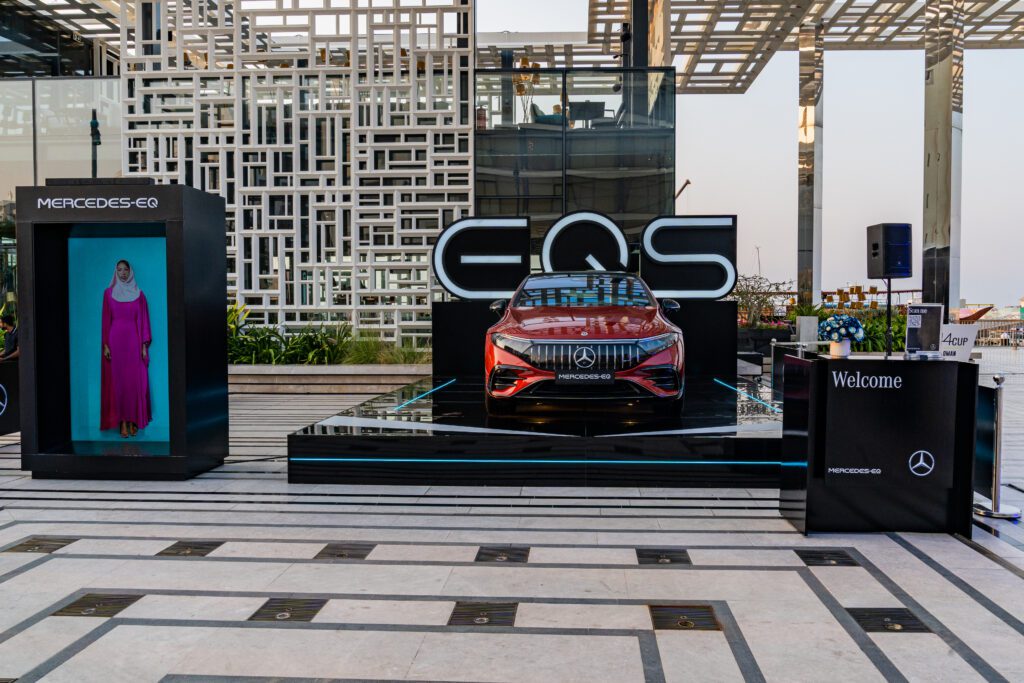With Oman committing to reach net-zero carbon emissions by 2050, the onus is as much on the private sector as it is on the government. Dealers and suppliers of automobiles, in particular, are required to formulate constructive roadmaps to meet the set targets, one of which is to ensure that at least 79 percent of vehicles in the country are electric by 2035.
“At Mercedes-Benz, we believe that the future will be electric,” states Shaun Michael, CEO of Mercedes-Benz Oman, as he deliberates on the growth and reach of electric vehicles in a candid interview with Business Plus.
Also, Shaun Michael talks about the efforts made by Mercedes-Benz to achieve technological leadership in electric driving against the backdrop of Oman’s national strategy for an orderly and smooth transition to net-zero carbon emissions.
Excerpts from the interview:
With Mercedes-Benz producing and selling electric vehicles (EVs), what are your future EV plans as far as Oman’s automobile market is concerned?
The world has been accelerating towards an emissions-free and digital-driven future, which Oman has reciprocated by committing to reach net-zero emissions by 2050. Since 2018, the transition from combustion-engine cars to both plug-in hybrid and all-electric vehicles has been under way at Mercedes-Benz when it introduced EQC, its first vehicle using Electrical Intelligence (EQ) technology. Since then, new Mercedes-EQ models have been introduced. From 2025 onwards, the plan is to enable customers to choose an all-electric alternative for almost every Mercedes-Benz model; all markets are expected to switch to electric-only by 2030, provided individual market conditions allow for this to happen.

Are your customers ready for the proposed EV plans?
At Mercedes-Benz, we believe that the future will be electric, and there is certainly a growing interest in electric vehicles among customers in Oman. The Ministry of Transport, Communications and Information Technology recently revealed that by 2035, at least 79% of all vehicles on the road should be electric, which is aligned with the national strategy for reducing carbon emissions. The adoption of plug-in hybrid and all-electric vehicles will therefore definitely hit a tipping point. For example, you can already notice the number of charging stations across Muscat, which is another sign of the growing transition from hydrocarbon-based fuels. At Mercedes-Benz, we are striving for technological leadership in electric driving, and we are looking forward to meeting the increasing demand by introducing innovative and powerful models in the near future.
Do you think more awareness is required to generate interest among auto enthusiasts in the country?
We realise that the majority of vehicles on the road today are still powered by combustion engines; deciding to buy an electrical vehicle instead takes a lot of consideration. However, people have become more and more environmentally-conscious and aware of the impact of carbon emissions. Customers are therefore more prone to be adopting alternative, sustainable options when it comes to their mobility. At Mercedes-Benz Oman, we are doing our part by introducing new electrical models by using innovative ways and special events to allow customers to become more familiar with this relatively new technology that is just as reliable and safe as the conventional combustion engine. We will continue to communicate the top reasons why one should consider buying an electric car, which include, but not limited to, cost-efficiency, a greener lifestyle, convenience, and customers do not have to compromise on style and performance.
What is the current demand for EVs among local customers? Would you say it is on a par with countries around the world?
Globally speaking, electric vehicle adoption differs quite significantly from one region to another. The adoption of electric vehicles and its charging infrastructure in the wider Gulf Cooperation Council region as such is still lagging behind China, the United States and Europe. However, the shift to electrical vehicles has slowly but steadily been picking up speed, especially in the luxury segment.
What are some of the key challenges that need to be addressed by manufacturers of EVs? How will Mercedes-Benz overcome them?
Mercedes-Benz has shifted from an electric-first to electric-only strategy and has invested a lot in cutting-edge technology, and most of the rollout bottlenecks have already been resolved. There has been some ‘anxiety’ among customers about not having enough battery charge to reach their destination, however, the latest technologies have brought up electrical vehicles to extended range standards that are similar to those of cars using combustion engines.
Could you highlight some of the new electrical vehicle models for car lovers in the country?
We recently sneak previewed the Mercedes-AMG EQS 53 4MATIC+, the first all-electric ambassador in the luxury, sportiness and performance segment. The sneak peek of this model took place ahead of the big reveal of the entire line-up of Mercedes-EQ range that have been engineered to offer future drivers an environmentally-friendly, aerodynamic and sustainable driving experience. As Mercedes-Benz continues to pioneer the new era of mobility, our customers are in for an exciting and rewarding experience as we are planning to launch the full range of our electric vehicle models by the end of this year’s third quarter, and which will include the EQA, EQB, EQE, EQS, Mercedes-EQS SUV and EQE SUV models.




